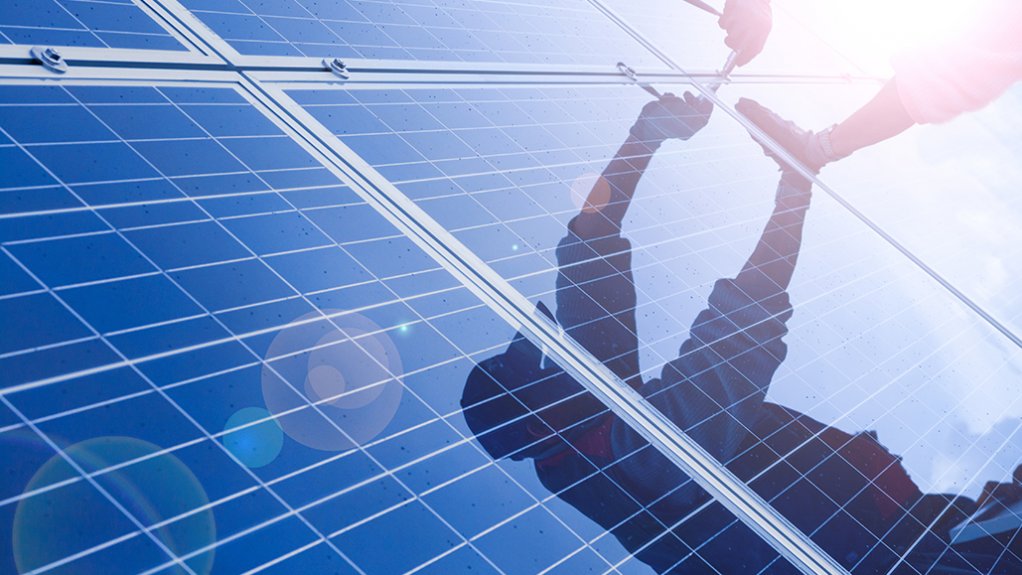Private sector investment in energy to lift employment, economic growth – report
Solar power investment will reduce loadshedding and increase employment growth in 2024, and jobs are being created on the back of a growing resilience among businesses against the negative impacts of loadshedding, says assurance, advisory and tax services firm PwC South Africa in its eighth 'South Africa Economic Outlook' report.
Employment is growing at a faster rate than many expected given the elevated levels of loadshedding. The pipeline for large-scale solar projects is also improving the outlook for economic and employment growth in 2024 and beyond, it says in the report.
Statistics South Africa (Stats SA) reported in August, that total formal and informal employment increased by 154 000, or 1%, from the first to the second quarter of 2023. Total jobs were also 784 000, or 5%, higher compared to the second quarter of 2022.
"This substantial increase in employment contrasts with weak economic growth owing to, among other factors, electricity loadshedding and supply chain disruptions. The strong increase in jobs over the past year is encouraging and reflects a growing resilience on the part of private businesses against the negative impacts of electricity outages," PwC South Africa says.
Eskom recently estimated that there is currently about 4 400 MW of solar photovoltaic (PV) rooftop capacity installed in South Africa outside of the Renewable Energy Independent Power Producer Procurement Programme (REIPPPP) versus less than 1 000 MW in capacity estimated for March 2022.
Electricity costs, supply interruptions and the need to procure green power have become strategic drivers of power investment by South African firms, PwC says.
South Africa currently has about 2 300 MW of embedded, or on-grid, solar capacity. The majority of these plants are owned by independent power producers that have fixed-term supply contracts with State-owned Eskom.
"Embedded solar capacity could increase by between 110% and 420% by 2030, depending on different assumptions and scenarios. Our baseline scenario sees embedded solar capacity increasing to 3 700 MW in 2025, and 5 800 MW by 2030, with the country moving towards greener sources of energy and away from coal-fired power stations," PwC South Africa says.
Operation Vulindlela is tracking a pipeline of 10 000 MW in private sector energy generation projects. The positive impact that this will have on the power supply in the country and on individual business operations makes for a more positive economic growth outlook for 2024 and beyond.
"We expect the economy to grow by 1% next year, or as high as 1.3% under an upside scenario."
Further, from a household perspective, residential solar power capacity is expected to grow by 5.4% a year over the next several years owing to the growing uptake of domestic backup power systems, the report added.
PURCHASING POWER EROSION
According to Stats SA, salaries and wages earned in formal and informal employment accounted for 53% of household income in South Africa in 2022. As such, the continued rise in employment is a positive signal in the outlook for consumer spending.
Salaries and wages in South Africa increased on average by 4% in 2022 compared with an average inflation rate of 6.9%. This translates into a 2.9% decline in real, or inflation-adjusted, income or a 2.9% decline in household buying power.
“We expect salaries and wages to increase by 5.2% in 2023 versus an average inflation rate of 6%. This results in a 0.8 percentage point decline in the real value of salaries and wages, compared to a 2.9 percentage point decline in 2022. As such, the slowdown in inflation will help ease the decline in consumer buying power,” says PwC South Africa senior economist Christie Viljoen.
The decline in real salaries and wages is slowing as consumer price inflation continues to trend lower.
“In the current economic climate, South African companies are struggling to pay higher remuneration to their employees. As such, consumer buying power will again decline this year, albeit by a smaller margin compared to 2022.
“Slow growth in salaries and wages coupled with limited fiscal space to increase grant payments resulted in real, or inflation adjusted, household expenditure increasing by only 2.5% in 2022. Real consumption expenditure by households increased by just 0.7% year-on-year in the first quarter of 2023,” she said.
On the monetary policy front, PwC South Africa believes the repo rate has likely peaked alongside a decline in consumer price inflation, adds PwC South Africa chief economist Lullu Krugel.
Another key metric being monitored is the real repo rate, or the inflation-adjusted return provided by domestic interest rates. The South African Reserve Bank (SARB) expects the real repo rate to increase from -1.4% in 2022 to 2.7% this year and 3% in 2024.
“This is above the SARB’s view of a steady state neutral real interest rate of 2.5%. In other words, the trends in the nominal repo rate and inflation both point to an on-goal real repo rate in the near future.
“The next step in the interest rate cycle will then most likely be a reduction in the repo rate as inflation abates further. We believe this is likely to start around the middle of next year pending, as the SARB has often said, favourable data and risk developments,” says Krugel.
“However, we do not anticipate interest rates to come down again to the low levels seen in 2020. Instead, it is likely that two percentage points could be shaved off towards the end of 2025. That would bring the repo rate back to pre-pandemic levels and support household spending,” she noted.
Additionally, while retail spending is under pressure from deteriorating personal financial circumstances associated with tough macroeconomic conditions, these headwinds also provide opportunities to drive customer loyalty, says PwC South Africa head of experience consulting Riaan Singh.
“Consumer-facing companies must prioritise efforts to better understand younger and more economically diverse groups, as recognising their needs and preferences can provide opportunities to grow their loyalty.”
Further, PwC’s Global Consumer Insights Survey Pulse 6 found that South African consumers are willing to pay more for sustainably produced goods, with eight out of ten consumers in the survey of mostly employed South Africans saying they are willing to pay up to 10% above the average prices for goods that have a lower carbon footprint and are biodegradable, he noted.
“About three-quarters of South Africans in our survey sample earn less than R400 000 a year, suggesting that environmental consciousness is not just important for the affluent,” he highlights.
Comments
Press Office
Announcements
What's On
Subscribe to improve your user experience...
Option 1 (equivalent of R125 a month):
Receive a weekly copy of Creamer Media's Engineering News & Mining Weekly magazine
(print copy for those in South Africa and e-magazine for those outside of South Africa)
Receive daily email newsletters
Access to full search results
Access archive of magazine back copies
Access to Projects in Progress
Access to ONE Research Report of your choice in PDF format
Option 2 (equivalent of R375 a month):
All benefits from Option 1
PLUS
Access to Creamer Media's Research Channel Africa for ALL Research Reports, in PDF format, on various industrial and mining sectors
including Electricity; Water; Energy Transition; Hydrogen; Roads, Rail and Ports; Coal; Gold; Platinum; Battery Metals; etc.
Already a subscriber?
Forgotten your password?
Receive weekly copy of Creamer Media's Engineering News & Mining Weekly magazine (print copy for those in South Africa and e-magazine for those outside of South Africa)
➕
Recieve daily email newsletters
➕
Access to full search results
➕
Access archive of magazine back copies
➕
Access to Projects in Progress
➕
Access to ONE Research Report of your choice in PDF format
RESEARCH CHANNEL AFRICA
R4500 (equivalent of R375 a month)
SUBSCRIBEAll benefits from Option 1
➕
Access to Creamer Media's Research Channel Africa for ALL Research Reports on various industrial and mining sectors, in PDF format, including on:
Electricity
➕
Water
➕
Energy Transition
➕
Hydrogen
➕
Roads, Rail and Ports
➕
Coal
➕
Gold
➕
Platinum
➕
Battery Metals
➕
etc.
Receive all benefits from Option 1 or Option 2 delivered to numerous people at your company
➕
Multiple User names and Passwords for simultaneous log-ins
➕
Intranet integration access to all in your organisation




















